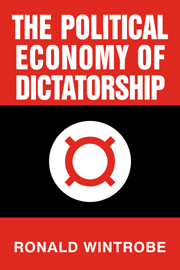Book contents
- Frontmatter
- Contents
- Dedication
- Acknowledgments
- Part I Introduction
- Part II Equilibrium political repression
- Part III Economics of autocracy
- 6 The economy of dictatorship
- 7 Redistribution and rent-seeking
- 8 Apartheid
- 9 The bureaucratic economy I: the model
- 10 The bureaucratic economy II: rise and fall
- Part IV The dynamics of dictatorship
- Part V Conclusion
- References
- Name index
- Subject index
8 - Apartheid
Published online by Cambridge University Press: 05 June 2012
- Frontmatter
- Contents
- Dedication
- Acknowledgments
- Part I Introduction
- Part II Equilibrium political repression
- Part III Economics of autocracy
- 6 The economy of dictatorship
- 7 Redistribution and rent-seeking
- 8 Apartheid
- 9 The bureaucratic economy I: the model
- 10 The bureaucratic economy II: rise and fall
- Part IV The dynamics of dictatorship
- Part V Conclusion
- References
- Name index
- Subject index
Summary
It was just too expensive.
“Pik” Botha, explaining on ABC News his government's decision to abandon apartheidIntroduction
The system of apartheid in South Africa has passed into history. But what was apartheid, exactly, as a political–economic system? Whose interests did it serve, and why was it abandoned? Perhaps surprisingly, there are no clear-cut, satisfactory answers to these questions. Moreover, there are a number of reasons why the Apartheid Laws are of general interest. First, they provide one of the few explicit examples of labormarket regulations which are usually only implicit but which are generally characteristic of many dictatorships. In particular, two of the hallmarks of apartheid regulation – job reservation (in which certain kinds of jobs were reserved for specific groups) and influx control (in which only black workers with a “pass” were allowed to work in the whitecontrolled manufacturing sector) – are widely, if more informally, practiced by nondemocratic regimes, and examination of their operation in the context of the apartheid system can be expected to yield insights into how they work in general.
Second, the Apartheid Laws provide a useful illustration and testing ground for the exploration of theories of economic exploitation, in which one group uses its political power over another to appropriate its earnings. It is a commonplace that this can be done through the government's tax and transfer system. What is striking about the apartheid system is how the Apartheid Laws of job reservation and influx control were used by whites to appropriate the earnings of blacks through the marketplace.
- Type
- Chapter
- Information
- The Political Economy of Dictatorship , pp. 163 - 196Publisher: Cambridge University PressPrint publication year: 1998



